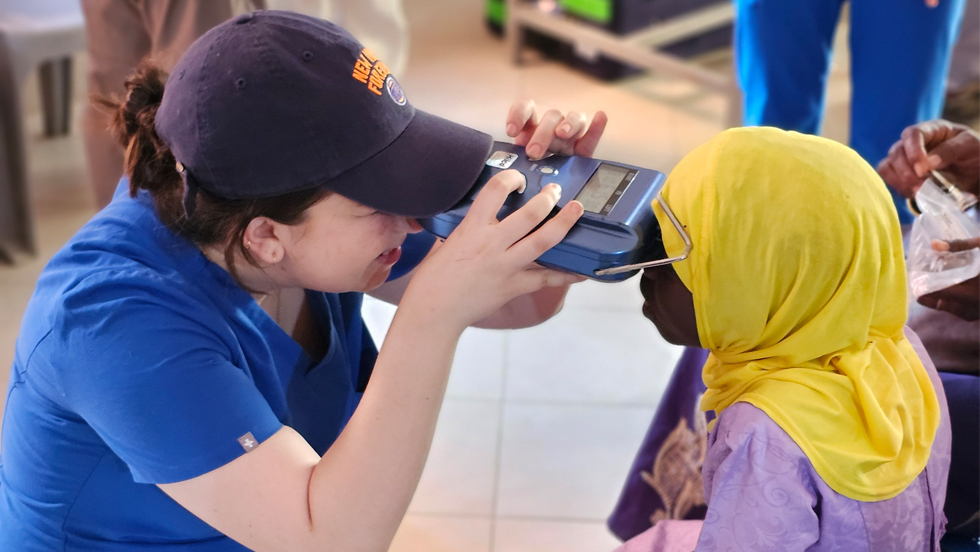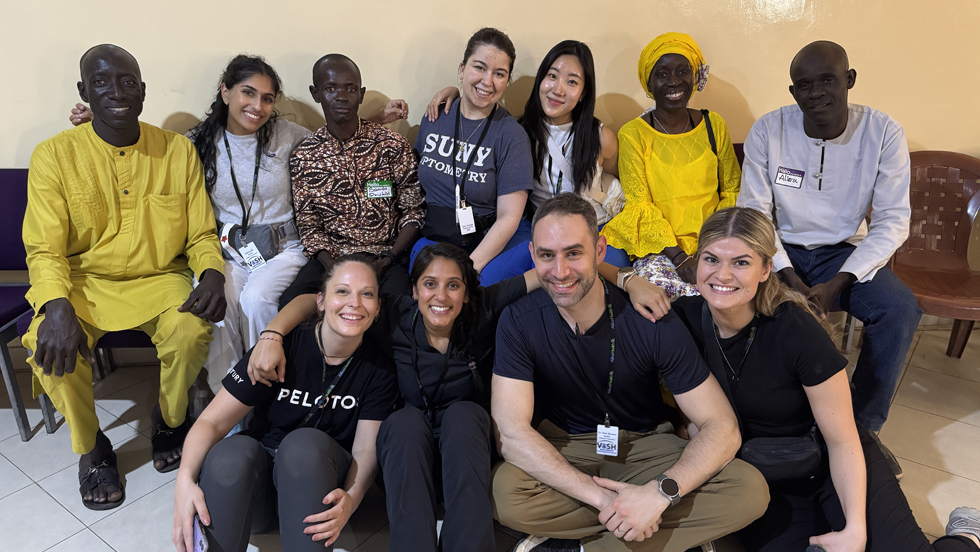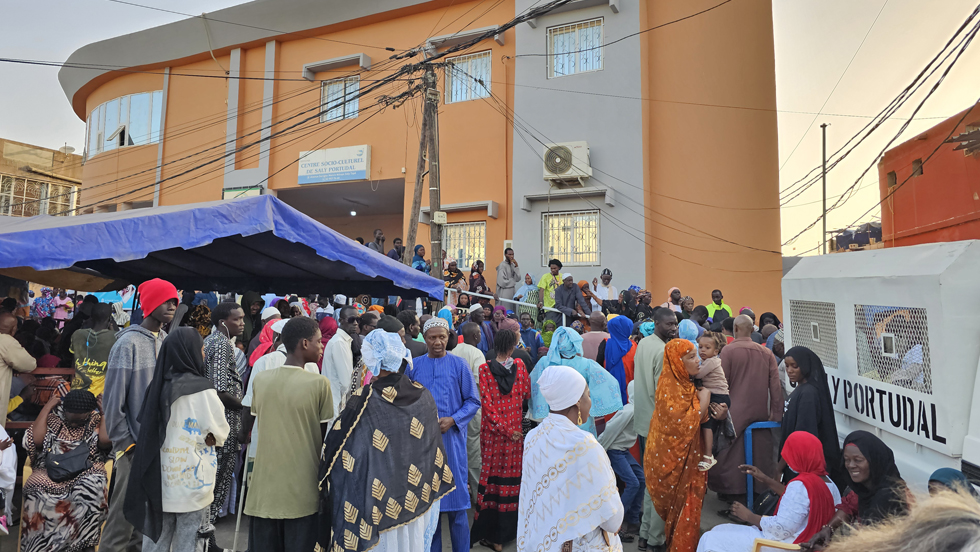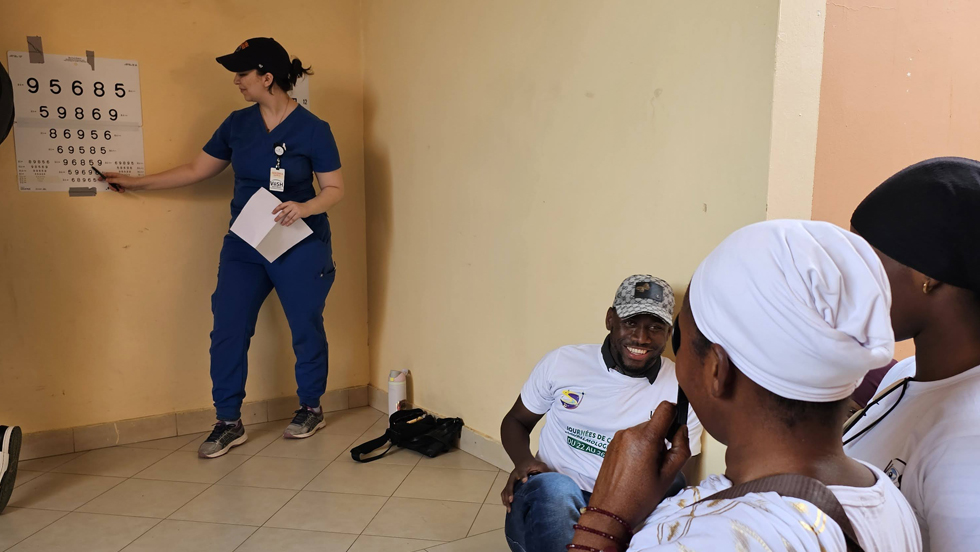
An educational experience abroad is an invaluable one, and no one understands that better than Anastasia Dakis ’22. She spent seven days performing optometry services in Senegal, a country in West Africa.
Pursuing a Doctorate Degree in Optometry
After attaining her BS in biology from Adelphi’s College of Arts and Sciences, Anastasia Dakis ’22 took her love of science one step further. She enrolled in the Doctor of Optometry program at SUNY College of Optometry, a school which shares a prestigious 3+4 joint degree program with Adelphi. Selected students earn direct entry into the SUNY program, saving both time and tuition.
“There’s a common misconception that optometry is solely about prescribing eyeglasses, but this has been only a minor part of my journey so far,” said Dakis. “Optometry can be likened to internal medicine for the eyes—just as internists must understand a wide range of diseases, optometrists must recognize diverse conditions. We treat the whole person, with the eyes frequently serving as the window to a broader picture.”
For the last three years, Dakis has served as a member of the Student Volunteer Optometric Services to Humanity through SUNY Optometry. SUNY organizes three optometry mission trips per year. Over the last academic year, students could choose between Panama, Grenada or Senegal. “I was particularly drawn to the experience in Senegal because it was a grassroots effort led by our sponsor, Mame Dabo,” said Dakis. “She’s a Senegalese woman who partnered with SUNY to establish this eye clinic last year. I felt inspired to ensure the continuation of this important effort.”
In Africa, Helping Thousands of Patients in Five Days
Dakis’ studies took her to Saly, Senegal, a seaside town of about 20,000 residents. Right away, she was astounded by the country’s beauty. “It felt like I had just discovered a hidden gem,” she said. “Senegal also felt oddly familiar to me. The climate and environment reminded me a lot of Greece, where my family is from.”
At the clinic, Dakis worked with a team of 20 doctors and student doctors, as well as a few translators. These were mostly community volunteers who had received an English-language education and could translate the three languages spoken by the Senegalese patients: French, Wolof and Arabic. “At times, my mind felt jumbled trying to navigate these three languages,” Dakis admitted. “By the end of our time there, however, I became relatively self-reliant. Despite the language barrier, much of our most meaningful communication happened nonverbally.”

Dakis, fourth from left top row, with fellow volunteers, translators, student doctors and organizers.
Dakis and her team provided comprehensive eye examinations to approximately 3,400 patients over five clinic days. What she saw and treated in Senegal differed considerably from the patients she saw in New York. She encountered conditions among Senegalese that are rarely seen in the United States but that she had learned about in school. “It was incredibly rewarding to finally witness a real-life presentation of a condition I had previously only encountered in textbooks,” she said. Dakis also saw many cases of traumatic cataracts in young people, another rarity in the United States.
On the flip side, Dakis saw fewer cases of diabetic or hypertensive retinopathy in Senegal, chronic diseases that are more prevalent in the United States and other industrialized nations. Despite limited access to medical resources, the average Senegalese patient appeared healthier than the average American patient, most likely a reflection of differences in lifestyle and diet.

By day seven of Dakis’s clinic, 900 Senegalese men, women and children were lined up, waiting to be seen.
The eye clinic’s patient volume increased exponentially each day during Dakis’ visit. On day 1, her team saw about 500 patients. By day 7, that number had grown to nearly 900 patients, with people lining up as early as 5:00 a.m. to receive eye care. All clinic patients were dilated to assess the internal health of the eye and received glasses prescriptions. For most patients, that was all they needed. Others, however, required more treatment—and Dakis was able to dispense medication directly to them. “Imagine receiving medication straight from your doctor, without dealing with insurance approvals, pharmacy wait times or copays,” said Dakis. “In many ways, the care felt more direct, immediate and effective. It was the essence of practicing medicine in its purest form—free from red tape—and it was invigorating.”
Study Abroad Offered a Renewed Sense of Purpose
Dakis left West Africa with a broadened and enriched perspective, deeply moved by the overwhelming love and hospitality of her patients. Her work in Senegal better prepared her for higher patient volume. It also highlighted how eye care can change a person’s life. A glasses prescription for a young patient can alter the trajectory of their educational journey, while a dilated exam can detect life-saving signs of disease.
Dakis’ time in Senegal also underscored the holes in different healthcare systems. “Witnessing people wait for hours—sometimes all day—for what might be their only chance at eye care that year gave me a profound sense of appreciation and disbelief,” she said. “In contrast, I live in a world where I can schedule a virtual appointment and receive antibiotics by mail the same day. The disparity is seismic, and it’s something that continues to motivate me to return and support Mame in her mission.”

Performing an eye chart test on local residents, free of charge.
Dakis’ educational journey isn’t over quite yet. She’s currently in her externship year, rotating through various eye clinics, hospitals and private practices. After graduating in May 2026, Dakis plans to pursue a residency in ocular disease. Above all, Senegal gave Dakis a renewed sense of purpose and reminded her of the true essence of her role—helping people see, while caring for the whole patient.